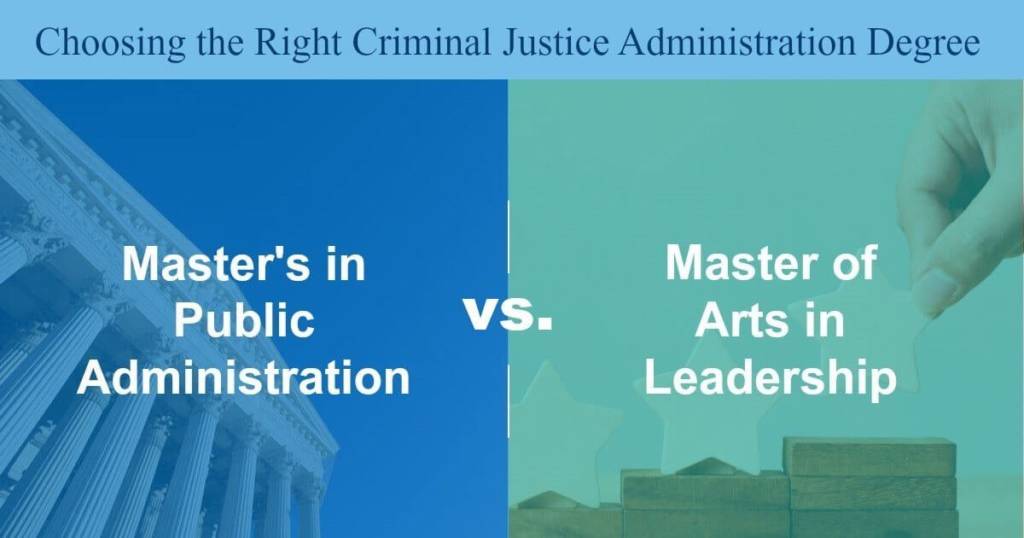Working in law enforcement has traditionally required very little formal education past high school or community college. But times are changing, and police officers are being asked to refine their skills in a variety of areas: use of force, de-escalation, communication, community relations and leadership to name a few. In the past, job-related training combined with experience were the rule of thumb. But studies have shown that officers who have a college degree in addition to professional training are 40% less likely to use force, which is critical in today’s climate. As discussions surrounding police tactics and practices take center stage, more public safety professionals are recognizing the value of higher education, even going so far as to attain a master’s degree — increasing not only their leadership skills but also their salaries.
The right higher education program can offer law enforcement professionals the tools needed to better handle disputes, think critically, problem-solve, communicate effectively, and resolve conflicts through a variety of means.
Of course, a master’s degree isn’t required to be an effective police leader, but it has been shown to improve the odds of career advancement.
[RELATED] Positioning Yourself for a Promotion? Download the Free eBook: “Moving Up the Ranks” >>
Who Should Get a Master’s Degree in Law Enforcement?
Many people associate a criminal justice master’s degree student with a young law enforcement officer pursuing a promotion or even a salary increase. And while that profile is not inaccurate, data shows that there are other motivating factors for law enforcement professionals to seek a master’s degree throughout their careers — even as they near retirement.
For example, at the University of San Diego, the students who enroll in the online MS in Law Enforcement & Public Safety Leadership program typically fall into one of four categories:
- Early-career students who want to obtain their master’s degree while they’re still flexible in their career/personal lives, to set them up for promotional opportunities later in their careers.
- Mid-career law enforcement professionals looking to diversify their skill sets and compete for leadership positions within their agencies/departments.
- Seasoned command staff currently serving in a leadership role, who are looking to refine and enhance their leadership skills in an effort to be more effective on the job and increase their opportunities for further career growth.
- Late-career law enforcement officers near retirement or post-retirement, looking to continue learning and possibly transition to the private sector or teaching opportunities as a second career.
Will a Master’s Degree Pay Off? A Look at Law Enforcement Salaries
Even if the cost of tuition is covered by your GI Bill or other scholarship money, completing a master’s degree takes time and commitment. Will it be worth it? Beyond learning practical skills to use on the job and in the field, master’s degree programs can help you get promoted, earn a salary increase, and develop your leadership, communication, and management skills. When your department is evaluating potential candidates to promote, higher education is one of the best ways to help your resume stand out. In addition to having extensive experience across many policing assignments, education is one of the most heavily weighted qualifications.
With regard to pay, many agencies and departments offer financial incentives and payscale ladders that are directly correlated to an officer’s level of education. In 2020, the LAPD announced new education incentives that reward officers with college degrees with varying bonuses added to their paychecks depending on the level of their college degree. Translation: even without a promotion, getting your master’s degree might put extra money in your paycheck, either through a bonus or a higher pay scale.
In addition, getting your master’s degree accelerates the speed at which you are able to attain intermediate and advanced POST (Peace Officer Standards and Training) certifications. And most departments will reward intermediate and advanced POST certification with additional bumps in pay.
In El Paso, Texas law enforcement personnel holding a master’s degree from an accredited college receive an additional $200 per month, which translates into an extra $2,400 annually. With an advanced POST certificate, officers get an additional $105 per month ($75 for intermediate).
In some Massachusetts cities, police officers get percentage bonuses depending on what degree they earn. For example, Cambridge Police Department officers with an associate’s degree get a 10% bonus. If they have a bachelor’s degree they get a 20% bonus and if they have a master’s degree they get a 25% bonus. Depending on where you’re starting, that could equate to a lot of extra money.
These are just a few examples of departments that reward those who seek college degrees. Overall, this type of pay incentive scale is typically based on education level, certifications achieved, and years of experience in the field.
Promotions Are Often Tied to Education
In order to promote from a police officer to a detective or sergeant, and eventually land a command staff position, you will usually need both education and experience. While an associate’s degree used to get you far in most criminal justice agencies, today the standards are much higher. Additionally, education will likely play a key role in future police department standard updates.
A master’s in criminal justice can help you get promoted or serve as an entry point for a competitive job, such as a position in a new department or agency. The critical skills learned in these programs are all essential for leaders in any field, but are particularly useful for those working in law enforcement. Plus, getting your master’s shows motivation and passion for the field, which always looks good to higher-ups or potential new employers.
Cost of a Master’s Degree
The cost of higher education is often one of the most important considerations for anyone thinking of pursuing an advanced degree. Costs will always vary depending on the school and program, but prospective students should weigh what it will cost to get that degree and research options for reducing the financial impact.
Across all degree programs and professions, most people finish their graduate degree with an average of $57,600 in debt according to U.S. World & News Report, but that range can sometimes top the $100,000 mark. That’s a huge range and varies according to a number of factors including the length of the program, the specific degree you earn, and the type of school you attend – state, private or online.
When it comes to getting a master’s degree in criminal justice or law enforcement, however, you shouldn’t have to shell out anywhere close to $100,000. In fact, you will probably find a number of programs that offer tuition rates below $30,000. For example, at the University of San Diego, tuition for the online MS in Law Enforcement and Public Safety Leadership is $729 per credit with a total of 31 required credits. That equates to just $22,599 for the entire degree.
Degree programs that are administered online typically cost less than in-person programs because they require less investment in infrastructure for the university. A number of regionally accredited and highly ranked universities like University of San Diego now offer online master’s degree programs in law enforcement or criminal justice, making the financial commitment far more affordable.
[RELATED] Comparing Programs: What Criminal Justice Master’s Degree is Right For You?
Bringing Down the Cost of a Degree
In order to bring down the cost of a master’s degree, it is important to consider financial incentives and alternative funding options. In addition to traditional student aid, there are a number of scholarship programs and tuition assistance programs available, especially if you’re a veteran.
GI Bill Entitlements
Many law enforcement professionals come into the field after serving in the military. Consequently, they have GI Bill entitlements that offer funding for education. According to the US Department of Veterans Affairs:
“If you have at least 90 days of aggregate active duty service after Sept. 10, 2001, and are still on active duty, or if you are an honorably discharged Veteran or were discharged with a service-connected disability after 30 days, you may be eligible for this (GI Bill) VA-administered program. For approved programs, the Post-9/11 GI Bill provides up to 36 months of education benefits, generally payable for 15 years following your release from active duty.”
One student in the University of San Diego’s online master’s program remarked that for a number of years he didn’t even realize he had GI Bill entitlements waiting for him. So if you have served, fit the qualifications listed above but aren’t sure if you have GI Bill entitlements, be sure to check. It could potentially cover the full cost of your education.
Yellow Ribbon Program
Some universities take part in the Yellow Ribbon Program, which offers veterans additional financial funding on top of any GI entitlements they may have earned. For example, if you use all of your GI entitlement money to fund your education but still have a balance, the Yellow Ribbon Scholarship Program could help cover the remaining costs.
Employer Tuition Assistance
If you are considering a master’s degree in law enforcement, you are likely a current professional working in the field. In order to encourage professional and personal development, many departments offer some form of tuition assistance. Be sure to ask your agency or department what tuition assistance benefits they offer.
If being promoted to a supervisory (and eventually command staff) role is your goal, a master’s degree is always going to be worth it. A top tier criminal justice master’s degree will help you develop your skills in budgeting, finance, staffing, decision making, conflict resolution, and other key areas of organizational leadership. In many agencies you’ll have a hard time promoting to a command position without a master’s degree; in fact, one study found that more than 35% of police chiefs have a master’s degree. The key is to find a degree program that will help you achieve your goals by offering you a current and practical curriculum that prepares you to serve your department, and your community, more effectively.
Programs like the University of San Diego’s Master’s degree in Law Enforcement and Public Safety Leadership deliver robust content in an online environment, which is ideally suited to the unpredictable schedule of someone working in law enforcement or public safety. While many master’s degree options exist, finding a program that is focused specifically on law enforcement leadership can have the added benefit of connecting you to a powerful network of other law enforcement leaders from agencies across the country.





